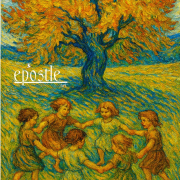My Neighbor
Armodoxy for Today: My Neighbor
“Love your neighbor,” said Jesus, to a man looking for the answers to life. The man responds to Jesus with a question which leads us to one of the most celebrated parables of Christ, yielding the greatest measure and definition of Christian love, compassion and outreach. The man simply asks, “Who is my neighbor?”
Jesus answers, “A certain man went down from Jerusalem to Jericho, and fell among thieves, who stripped him of his clothing, wounded him, and departed, leaving him half dead. Now by chance a certain priest came down that road. And when he saw him, he passed by on the other side. Likewise, a Levite, when he arrived at the place, came and looked, and passed by on the other side. But a certain Samaritan, as he journeyed, came where he was. And when he saw him, he had compassion. So he went to him and bandaged his wounds, pouring on oil and wine; and he set him on his own animal, brought him to an inn, and took care of him. On the next day, when he departed, he took out two denarii, gave them to the innkeeper, and said to him, ‘Take care of him; and whatever more you spend, when I come again, I will repay you.’”
Jesus asks, “So which of these three do you think was neighbor to him who fell among the thieves?” The answer, obviously is the one who showed him mercy. Jesus then says, “Go and do likewise.” (Luke 10:25–37).
The story of the Good Samaritan has been heard from Sunday School classrooms to pulpits, from children’s books to movie screenplays, and, most importantly, has certainly stirred many people to action. Perhaps the one point that hasn’t been accented adequately is the definition of a Samaritan. We can deduce that it was a person who lived in Samaria, but the significance of that place, and the people of Samaria is what sets the parable of the Good Samaritan on fire. These were people that were looked down upon, held in very low esteem by the Jews of the time, so much so that they were outcasts from mainstream Jewish society. In John chapter 4, Jesus asks for a drink of water a Samaritan woman who responds, “How is it that You, being a Jew, ask a drink from me, a Samaritan woman?” And the Gospel evangelist adds, “For Jews have no dealings with Samaritans.”
Armodoxy demands that we place ourselves in the shoes of others. It challenges us to look at the full impact of Christ’s parables on our lives. And so, I am certain, that if Jesus were speaking to us today, the parable would be adapted to his audience. The spirit of this parable is to understand that the Good Samaritan is the object of our intolerance. Speaking to Armenians, the hero character would be a Turk who pulls out his credit card and covers the hospital expenses until his return. To the Israeli, the hero would be a Palestinian. To the Ukrainian, a Russian. To the white supremist, a black man. And to the self-appointed righteous, perhaps a member of the LBGT community?
Yes, the message is an uncomfortable one. Jesus was not one to keep us in our comfort zones. The number of Samaritans in the entire world today is under 1,000 individuals, accenting even more that the bottom line of the parable is not aligning ourselves with the Samaritans, but rather answering the question, “And who is my neighbor?” The one who offers mercy, to which Jesus’ message is addressed to us, “Go and do likewise.” Today, we are invited to seek the “neighbor” in everyone, even a foreigner or a so-called enemy.
Let us pray, “Lord Jesus Christ, you instructed us to not judge, but to live. With all the complexities of life today, open my heart to your love, so I may see my neighbor in everyone and others may see their neighbor in me. Amen.”

 2009 Fr. Vazken Movsesian
2009 Fr. Vazken Movsesian
 2025 Epostle
2025 Epostle 2026 Epostle
2026 Epostle 2025 Fr Vazken
2025 Fr Vazken



 2009 Fr. Vazken Movsesian
2009 Fr. Vazken Movsesian 2009 Fr. Vazken Movsesian
2009 Fr. Vazken Movsesian
Leave a Reply
Want to join the discussion?Feel free to contribute!